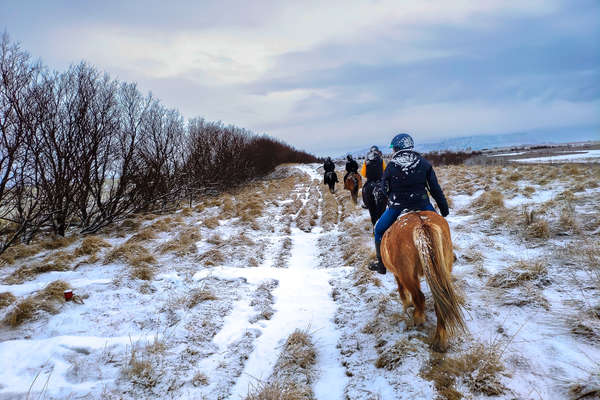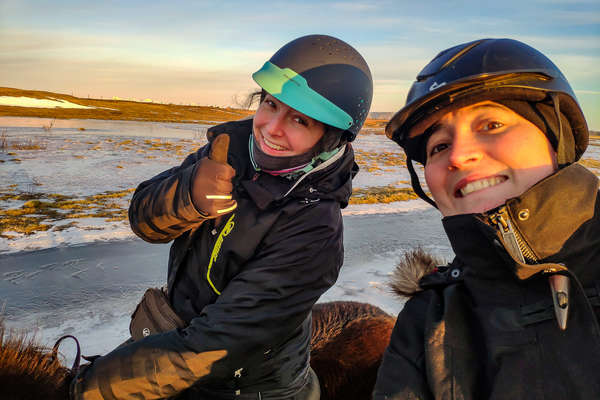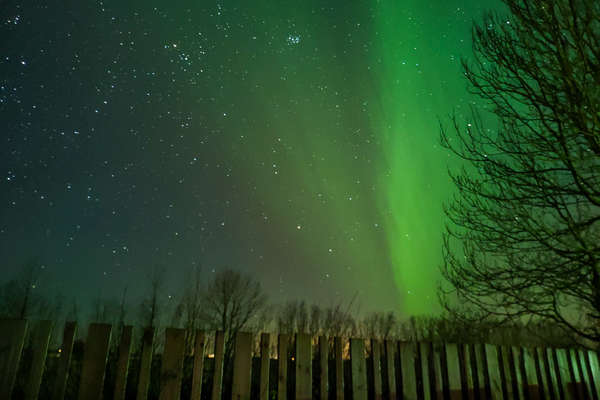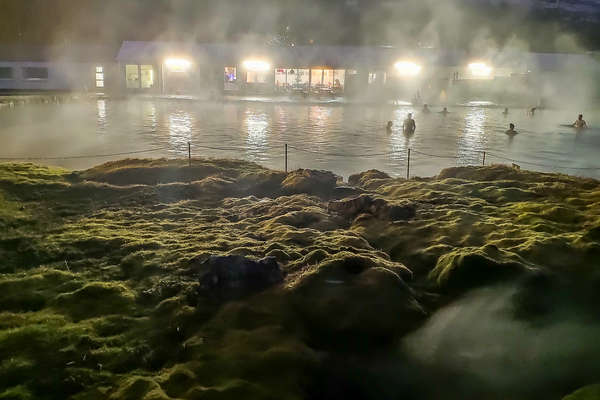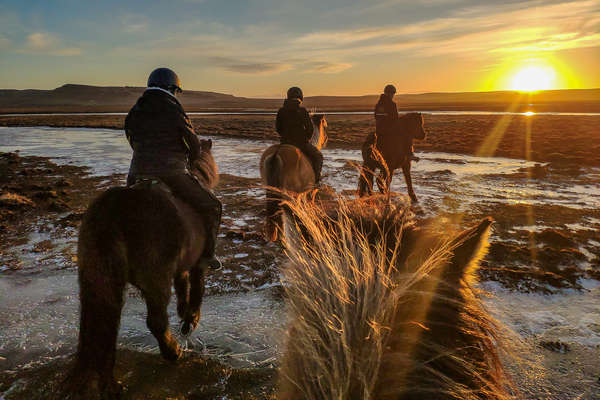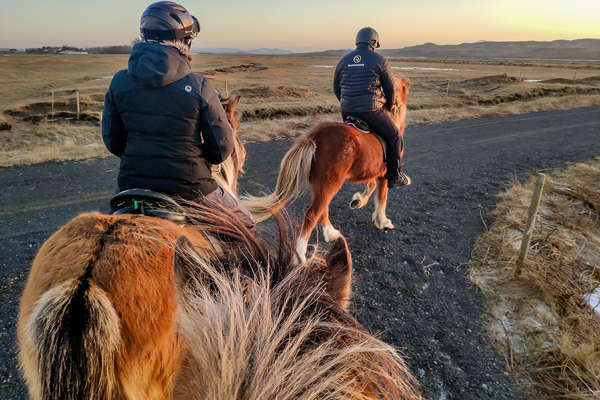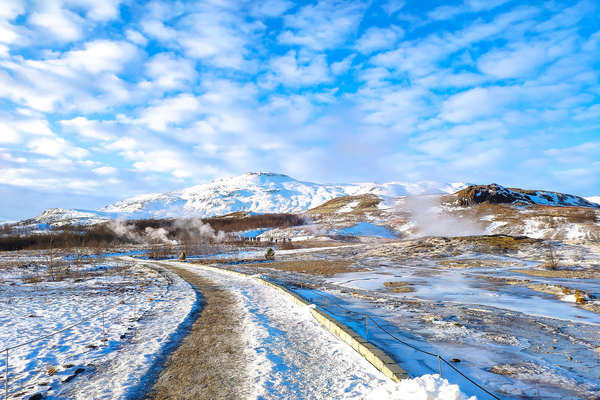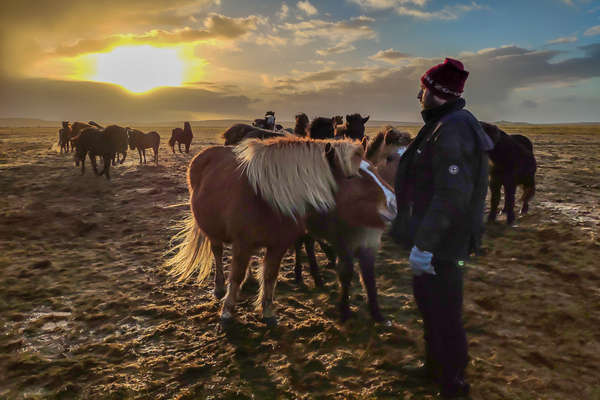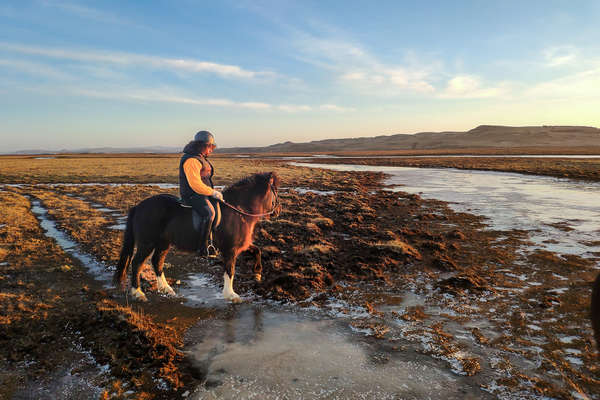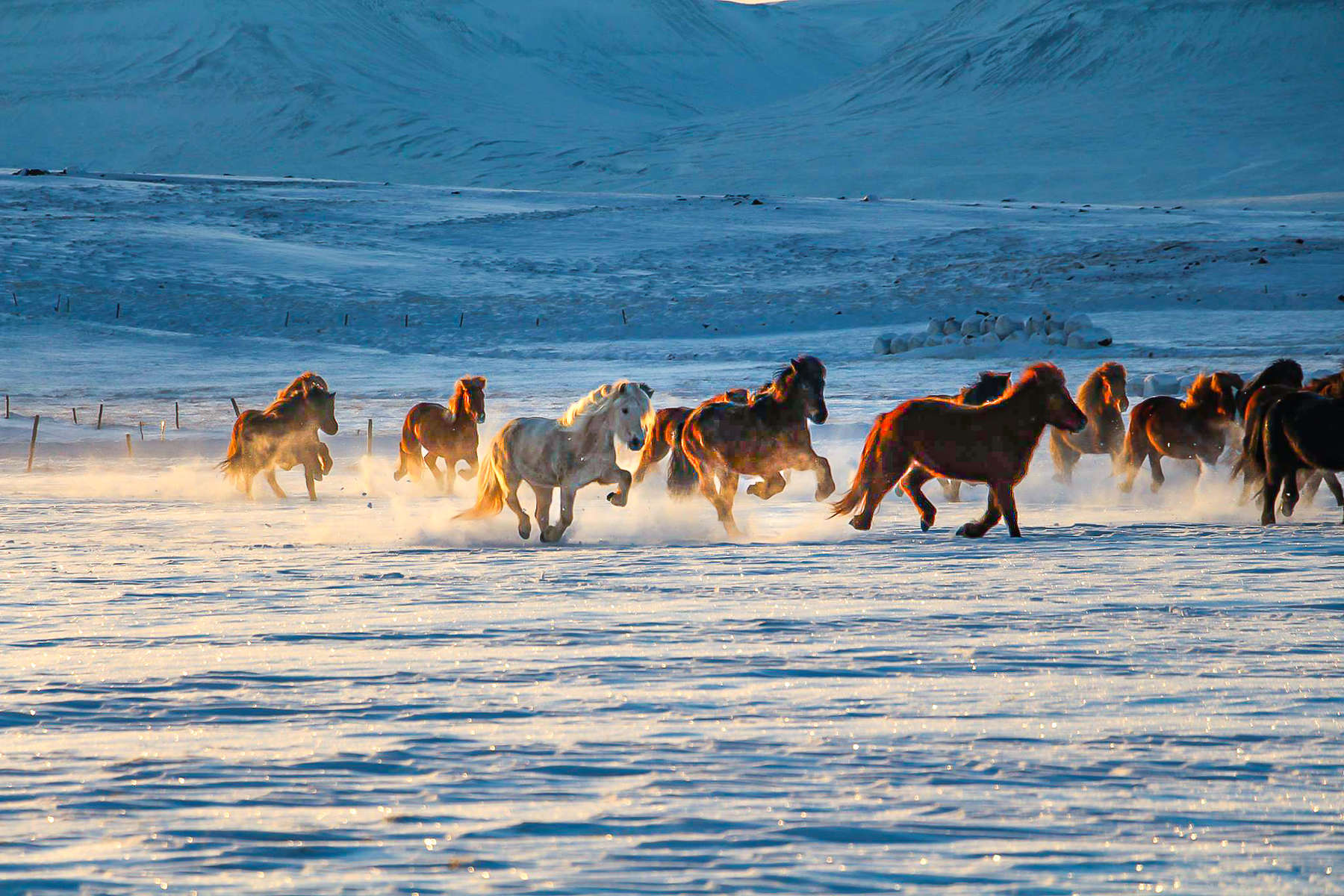
Itinerary
Highlights
- Experience the magical Icelandic horse on fine riding paths
- Relax at the Secret Lagoon in its mineral rich waters
- Visit the famous Gullfoss Waterfall and Geysir hot springs
- Watch the night sky in the hope of seeing the Northern Lights (weather permitting - sightings cannot be guaranteed), and enjoy the blazing colours of the Icelandic fall.
Dates & prices
Price details
- Rates are per person, based on riders sharing a twin or 4-bedded room.
- There is normally no single supplement for the riding days as you should be prepared to share. On some dates a single room (shared bathroom) can be organised with a supplement: €150/£130/$175.
- Groups usually consist of 1 to 20 international riding guests plus guides. All departures are confirmed regardless of the number of riders on the tour.
- Transfers to and from Reykjavik airport are not included in the price for the trip. See here/ for more info on how to get from the airport to the city centre.
- Accommodation in Reykjavik is not included, but we can book a hotel for you upon request.
- Vegan and/or Gluten Free diets will incur on an extra supplement of around £90/€100/$110 per person.
- Children from 8 years of age can be accommodated provided they are good riders. Discounts are available for families of 3+ (two parents and one child aged 12+), and for children under the age of 12. Please contact us.
Please Note
The itinerary may be modified at anytime for security reasons, meteorological or events beyond our control such as blocked roads, rivers in flood, drought, strikes and local holidays. Equus Journeys, our local partners and their local guides will always strive to find the best solution and will alter the itinerary as needed.
The names of the hotels and accommodation are given for information only and depending on availability, they may be modified without notice and replaced by another of a similar standard.
Price includes
Support Team
Logistic
Inland transports
Accommodation
Meals
Extra equipment
Extras
Price doesn't include
Meals
Beverages and personal extras
Transport
International flights
Extra
Insurance
Optional
Accommodation
Equestrian info
Horses
Guide & local team
Horse breeding at the farm is a family affair: his parents, Gestur and Margrét started the business here in Kálfhóll many years ago. Gestur now takes care of the horses, and Margrét cooks dinner for the guests. They don't speak much English but are friendly people.
Minimum riding ability
Minimum riding ability
Rider weight limit is 110kg/17,3 st/242lb
Pace
Tacking ability and participation
Trip conditions and Requested experience
Riders who are not riding regularly are requested to get riding fit before joining the ride.
Equestrian equipment
Hard hats are mandatory. We recommend our riders to wear a helmet to the correct standard and you should bring your own to ensure a proper fit.
Travel info
Comfort
Please understand that accommodation in the highlands is always basic, with little privacy, small rooms and limited showers.
Meals
Dinners are generous and hearty (fish or lamb, usually).
Vegetarian diets can be accommodated with advance notice. Vegan and Gluten free diets can be accommodated at an extra cost.
Alcoholic beverages are not included in the tour price and are hard to get in the highlands. They can be bought at a reasonable price in the Duty Free Store at Keflavik Airport upon arrival.
Climate
Tips
Packing list
There are some important packing considerations for a riding holiday in Iceland. The Icelandic horses have had no contact with other equine species and are not vaccinated. They do not have any resistance to diseases which are common elsewhere in the world and so it is important to take precautions to prevent the spread of infections.
- You should NOT take the following products into Iceland: saddles, bridles, halters, saddle pads, whips, brushes or any leather products which have been in contact with a horse.
- Your riding clothes must be thoroughly cleaned at least 5 days before departure (riding breeches, jumpers, coats, gloves) and should be washed in temperatures of at least 40c.
- Items which cannot be washed at 40c, such as riding hats or leather boots must be thoroughly disinfected at least five days before departure:
1. Wash in detergent.
2. Dry thoroughly
3. Spray with a 1% solution of Virkon detergent (10g per litre of water)
For more details please visit the Icelandic veterinary authority website: www.mast.is/english/frontpage/import-export/import/ridingequipment
Head
- A riding helmet is compulsory and we recommend that you take your own to ensure a correct fit.
- A flyhat to wear over your helmet may be a good idea in the summer months, when flies can be be an issue
- Sunhat for when not riding
- Sunglasses - with a cord attached so they don't fly off when riding
- Buff or bandana for protecting your neck and face from the sun, wind or rain
- Warm hat for cold evenings/days
Upper body
- Thermals in case of cold weather
- Long sleeved shirts provide protection from the sun or extra warmth
- Down jacket or gilet for cold evenings
- T-shirts
- Lightweight fleece or jumper
- Warm polar fleece or equivalent (plus a spare in case one gets wet)
- Waterproof jacket - rain can be difficult to predict and it's better to be prepared. In the mountains the weather can change quickly
Legs
- Lightweight, comfortable riding trousers or jodhpurs - we recommend riding in them at home before taking them on holiday to ensure they don't rub. Take two pairs
- Waterproof over trousers
- Casual clothes for the evenings (jeans or walking trousers)
- Thermal trousers
Hands and Feet
- Comfortable riding boots. We recommend short boots with half chaps but you may wish to take long chaps. We don't recommend taking your favourite long leather boots in case they get damaged. It is recommended your boots are waterproof as you may be crossing rivers and they can get wet.
- Lightweight shoes or trainers for the evenings
- Sandals/flipflops
- Several pairs of warm socks
- Gloves - your hands are particularly exposed to the sun, wind or rain whilst riding
Nightwear
- Accommodation is in made up beds but you may find a sleeping bag liner (silk/cotton/fleece) adds extra comfort
- Slippers (you will have to remove your shoes inside the accommodation)
- An eye mask can help with the 24hr daylight
Other useful items
- Flynet against bugs
- Swimsuit - for hot tubs
- Camera and high capacity memory card. Spare battery
- Bumbag for carrying your camera and small items whilst riding
- Headtorch or small torch for moving around at night - bring spare batteries and bulbs
- Water bottle (2 litres or 2 x 1 litre)
- Wet Wipes or equivalent (for when washing facilities aren't available)
- Ear plugs (for light sleepers)
In your luggage
- Any liquids, such as shampoo, moisturiser, deodorant unless they are less than 100ml and all bottles can fit in a small, clear, plastic ziplock bag.
- Swiss army knife or equivalent
In your hand luggage
- Any valuables, such as your camera, ipod, ipad etc.
- Your riding hat
Medical kit
- Sunscreen and lip balm - should be high factor
- Insect repellent
- Any medication you regularly take
- Blister plasters in case of any rubs
- Antiseptic cream, plasters, aspirin, anti-histamine, insect-bite salve etc...
- Spare prescription glasses/contact lenses
- Eye drops
- Imodium or similar anti-diarrhoea medication
- Re-hydration sachets
- Antiseptic wipes
- Handwash gel
Our Recommendations
- Backpacks cannot be worn whilst riding. We recommend a small bumbag or a coat with pockets so that you can carry small items with you during the day (camera, sunscreen, lipbalm etc)
- We recommend travelling in your riding boots and carrying your hat and some riding clothes in your hand luggage - then if your luggage goes astray you are still able to ride!
- We recommend you carry a copy of your passport and insurance policy at all times.
Sustainable tourism
- Travel light. It's a little known fact, but the lighter you pack, the better for the environment as heavy bags will produce higher emissions (when flying a plane or driving a car!).
- Reduce plastic waste. Take your favorite reusable bottle with you. Avoid single-use bags, cups, or straws.
- Preserve nature. Always take your rubbish with you during the ride and recycle them. Leave all the flowers or plants as you found them, and never get too close when observing wildlife. Make sure to use eco-friendly products such as body wash or laundry detergent (if camping) to protect both your skin and the environment.
- Choose your experiences carefully. Respect animal life by not participating in any activities that abuse wild animals (shows, elephant rides, etc.).
- Support local populations. Buy local handicrafts, be respectful of customs, and learn about the culture of local communities.
- Share! Raise awareness among your family and friends about sustainable tourism.
Did you know?
Did you know?
The Aurora Borealis (Northern Lights) is
a natural light display in the sky, predominantly seen at high northern
latitudes. A similar phenomenon in the southern hemisphere is called the aurora
australis. The name comes from the Latin word for sunrise and the Roman goddess
of dawn - Aurora - and the Greek word for the north wind - Boreas.
The Aurora Borealis is caused by cosmic
rays, solar wind and magnetospheric plasma interacting with the upper
atmosphere. The charged particles enter the atmosphere from above, and the
ionisation of the particles and atmospheric constituents creates light
emissions.
The northern lights are most clearly
seen on a clear night against a dark sky, and so the remote highlands of
Iceland are perfect. During summer months Iceland experiences almost 24 hour
daylight, and so it's only possible to see the northern lights during the
autumn and winter months when there are long periods of darkness. Our Northern
Lights trail ride in Iceland runs during the winter months, when the nights are
lengthening and there is a good chance of seeing the lights, provided there is
no cloud cover!

